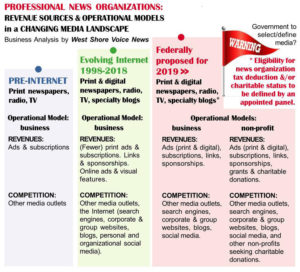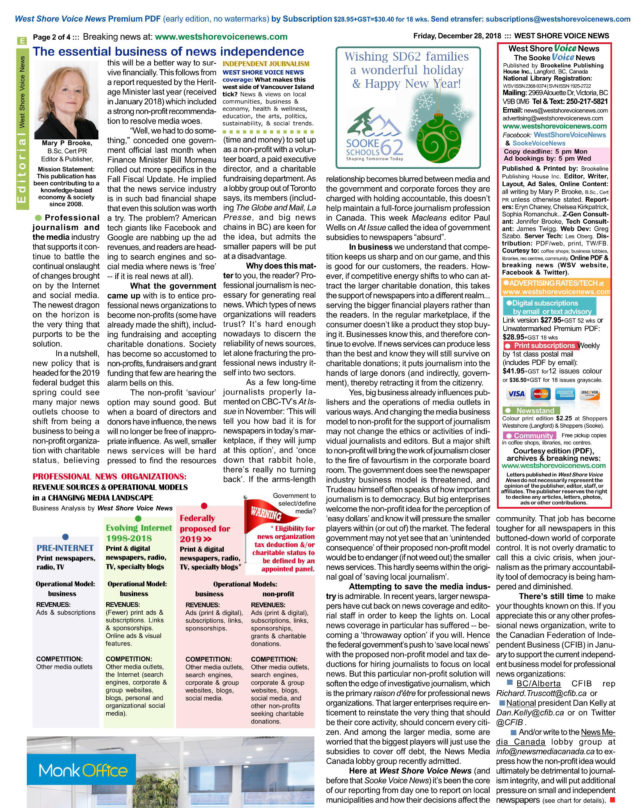EDITORIAL ~ December 28, 2018 ~ LANGFORD.
As first published in the December 28, 2018 print-PDF weekend edition of West Shore Voice News
Professional journalism and the media industry that supports it continue to battle the continual onslaught of changes brought on by the Internet and social media. The newest dragon on the horizon is the very thing that purports to be the solution.
by Mary P Brooke ~ West Shore Voice News
In a nutshell, new policy that is headed for the 2019 federal budget this spring could see many major news outlets choose to shift from being a business to being a non-profit organization with charitable status, believing this will be a better way to survive financially. This follows from a report requested by the Heritage Minister last year (received in January 2018) which included a strong non-profit recommendation to resolve media woes.
“Well, we had to do something,” conceded one government official last month when Finance Minister Bill Morneau rolled out more specifics in the Fall Fiscal Update. He implied that the news service industry is in such bad financial shape that even this solution was worth a try. The problem? American tech giants like Facebook and Google are nabbing up the ad revenues, and readers are heading to search engines and social media where news is ‘free’
— if it is real news at all).
What the government came up with is to entice professional news organizations to become non-profits (some have already made the shift), including fundraising and accepting charitable donations. Society has become so accustomed to non-profits, fundraisers and grant funding that few are hearing the alarm bells on this.

Why does this matter to you, the reader? Professional journalism is necessary for generating real news. Which types of news organizations will readers trust? It’s hard enough nowadays to discern the reliability of news sources, let alone fracturing the professional news industry itself into two sectors.
As a few long-time journalists properly lamented on CBC-TV’s At Issue in November: ‘This will tell you how bad it is for newspapers in today’s marketplace, if they will jump at this option’, and ‘once down that rabbit hole, there’s really no turning back’. If the arms-length relationship becomes blurred between media and the government and corporate forces they are charged with holding accountable, this doesn’t help maintain a full-force journalism profession in Canada. This week Macleans editor Paul Wells on At Issue called the idea of government subsidies to newspapers “absurd”.
In business we understand that competition keeps us sharp and on our game, and this is good for our customers, the readers. However, if competitive energy shifts to who can attract the larger charitable donation, this takes the support of newspapers into a different realm… serving the bigger financial players rather than the readers. In the regular marketplace, if the consumer doesn’t like a product they stop buying it. Businesses know this, and therefore continue to evolve. If news services can produce less than the best and know they will still survive on charitable donations; it puts journalism into the hands of large donors (and indirectly, government), thereby retracting it from the citizenry.
Yes, big business already influences publishers and the operations of media outlets in various ways. And changing the media business model to non-profit for the support of journalism may not change the ethics or activities of individual journalists and editors. But a major shift to non-profit will bring the work of journalism closer to the fire of favourtism in the corporate board room. The government does see the newspaper industry business model is threatened, and Trudeau himself often speaks of how important journalism is to democracy. But big enterprises welcome the non-profit idea for the perception of ‘easy dollars’ and know it will pressure the smaller players within (or out of) the market. The federal government may not yet see that an ‘unintended consequence’ of their proposed non-profit model would be to endanger (if not weed out) the smaller news services. This hardly seems within the original goal of ‘saving local journalism’.
Attempting to save the media industry is admirable. In recent years, larger newspapers have cut back on news coverage and editorial staff in order to keep the lights on. Local news coverage in particular has suffered — becoming a ‘throwaway option’ if you will. Hence the federal government’s push to ‘save local news’ with the proposed non-profit model and tax deductions for hiring journalists to focus on local news. But this particular non-profit solution will soften the edge of investigative journalism, which is the primary raison d’être for professional news organizations. That larger enterprises require enticement to reinstate the very thing that should be their core activity, should concern every citizen. And among the larger media, some are worried that the biggest players will just use the subsidies to cover off debt, the News Media Canada lobby group recently admitted.
Here at West Shore Voice News (and before that Sooke Voice News) it’s been the core of our reporting from day one to report on local municipalities and how their decisions affect the community. That job has become tougher for all newspapers in this buttoned-down world of corporate control. It is not overly dramatic to call this a civic crisis, when journalism as the primary accountability tool of democracy is being hampered and diminished.
There’s still time to make your thoughts known on this. If you appreciate this or any other professional news organization, write to the Canadian Federation of Independent Business (CFIB) in January to support the current independent business model for professional news organizations: BC/Alberta CFIB rep Richard.Truscott@cfib.ca or National president Dan Kelly at Dan.Kelly@cfib.ca or on Twitter @CFIB .
And/or write to the News Media Canada lobby group at info@newsmediacanada.ca to express how the non-profit idea would ultimately be detrimental to journalism integrity, and will put additional pressure on small and independent newspapers (see chart for details).
~ MPB
As first published on page 2 in the December 28, 2018 print/PDF issue of West Shore Voice News
Also: Journalism won’t be helped with non-profit business model (November 23, 2018)



